The princess and the marine
Tuesday, November 30, 2004Hi. I've moved this page to a new host. Click on the URL below to read the post and leave comments:
Sorry for the hassle.
Hi. I've moved this page to a new host. Click on the URL below to read the post and leave comments:
Sorry for the hassle.
... except in the presence of a male guardian.
From Al-Qabas, via Kuwait Unplugged:

These two guys definitely belong in Mahmood's TWITBTHIFD Society.
From ejAy-annE:
you could not bear talking to them [Indians] more than 15 minutes bragging in your face that he’s mr-knowing-everything (even their English has always –ing at the end of every word. you asthmatic one couldn’t for sure reach the hospital once you got inhaled their oregano smell. they are the most cunning, conceited, proud despite bastardized English speakers. they don’t know which are to be capitalized when they write and the most complainant living beings on earth. never attempt bargaining to them or you will go home with formed lines above your meeting eyebrows. as a neighbor, you will feel dizzy on their fishy smelling door and their curry aroma and you will almost everyday quarrel because they will never forget to complaint with just about everything. be it belonging to affluent or below ones category, they see money as gold on their hands that they are irreasonably frugal and wise over money. (Continued)
In one of my posts I spoke of the "Global Chaos" (term stolen from sensed) that exists in Bahrain, as opposed to the "cosmopolitan harmony" that some of us might want to portray the inter-ethnic relations on the island as. Despite the huge and varied number of nationalities and ethnicities residing here for generations, few of us know anything about the other, outside of employer-employee and customer-salesman relationships. The quote above is from a resident Filipina venting her feelings about the resident Indians here, and I thought it was a perfect example of this "Global Chaos".
For sure, she is pretty harsh on her Indian neighbours, but I think that everyone who has lived in Bahrain has gone through something similar. Whether it's a rant about "those lazy Bahrainis" at the Directorate of Traffic, "those snobby Brits" at the supermarket, "those unmannered Pakistanis" at the Suq, "those flamer Filipinos" at the barbershop, "those indecipherable Sri Lankans", or "those bloody Saudi drivers!", we've all been through it. Such stereotypes are likely to exist no matter what, but it is somewhat worrying how little we interact with each other and how little we really know about our neightbours. But I think that blogs like these offer the opportunity, on a very limited level, for people from different backgrounds to interact with each other, and hopefully helping to remove such stereotypes. Or at least, it will help us to learn which sterotypes are true, and where they arise from.
If I had the time, I'd love to write down all of my "pet peeves" about all the other ethnic groups on the island and share them with you. It would be a fun project no doubt.
Reading these harrowing stories in the papers on a daily basis, it may seem as though the situation is terribly bad and getting worse. However the mere fact that these accounts are now being reported in the Press is a very positive sign. Things like this used to happen all the time before also, but there was no one to stand up for the maids, so their stories went unheard. The Migrant Workers Group has done a tremendous job of representing abused workers and publicizing their stories. While they just don't have the recources to represent every single such case, the MWG must be commended for the work they have done. WIth their efforts, we hopefully won't have to read these reports so frequently in the future.
From Sunday's GDN:
Bid to stop injured maid flying out
By ROBERT SMITH
Human rights workers are trying to stop an Indonesian housemaid being sent home tonight, after being injured while trying to escape from her Kuwaiti sponsor.
Dewi Asrikak, aged 22, was injured when she tried to climb down from a second floor apartment after allegedly enduring a year of beatings from her sponsor's wife.
She also says she has never been paid, although her sponsor claims to have sent three months' salary to her family back in Indonesia and two months' salary to her agency.
Ms Asrikak is unable to walk and is recovering at Salmaniya Medical Complex, but her sponsor has reportedly booked her onto a Cathay Pacific flight to Jakarta, via Hong Kong, later today.
However, human rights workers are trying to delay her departure - at least until she is paid any outstanding salary or until her claims have been investigated.
They say the sponsor is refusing to pay her and says he spent the money on her medical treatment. (Continued)
He had earlier told her that he would pay her salary in full when she returned home.
Members of the Migrant Workers Group (MWG) have now appointed a lawyer and held last-minute talks with immigration officials, as well as a visiting consular officer from the Indonesian Embassy, in Kuwait, in an effort to keep her here.
But it was still not clear yesterday whether she would be made to leave or not.
"We are trying our best to keep her here and there is a lawyer on the case," an MWG volunteer told the GDN.
"But we still don't know if she will be released into our care or not."
He said they had asked the Labour and Social Affairs Ministry to intervene, but had been told that she must report to the ministry in person to file a complaint.
Ms Asrikak started working for the Kuwaiti family in November last year.
They live on the second floor of an apartment block in Manama.
She claims she worked from 5am to midnight with no day off, but even then the sponsor's wife would beat her with a brush, slippers or wooden spoons if she made a mistake.
The maid also claims she was called names and made to repeat the phrase "I am a donkey".
She says she tried to scale down the outside of the building on November 5 using some wire, but fell and hurt her feet.
"After some time her madam found her, made her crawl on her knees to the car and took her to Ibn Al Nafees Hospital where she was X-rayed and both her feet were bandaged," said the MWG volunteer.
"She was left in the car until the evening when she was taken to the airport to be deported to Indonesia.
"The airport authorities would not allow her to travel in her condition so she was brought back to Manama, slapped by her madam and then taken to SMC where her feet were operated on.
"Her right foot is in a hard cast and her left is still heavily bandaged."
An immigration official said yesterday that if doctors discharged Ms Asrikak then she would probably be allowed to travel.
He said the Kuwaiti family was claiming that she was paid, but did not keep any receipts. "They say she has been paid her dues," he said.
"The sponsor's wife also claims she stole something from her. If she is discharged from hospital there is no problem. She will be OK to travel."
The above article was published in the GDN on 28-Nov-04.
The granddaddy of Bahrain bloggers, Mahmood, has taken it a step further by coming up with BahrainiBlogs.com, a group blog for everyone from, on, or just interested in the island. So head over there, register yourself, and start writing.
Thanks Mahmood!
The second Bahrain Bloggers Meetup will be held this Thursday, so I'm writing this to encourage more of you to show up. As we've said before, you don't have to have your own blog to join us. Everyone in the Bahrain online community is invited, which includes all of you anonymous commenters and lurkers. The first meetup was great fun and I expect this one to be the same.
Click here for all the details about the meetup.
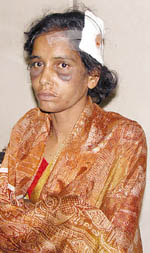
Why is it that some legal cases in Bahrain get a hearing and verdict within a few weeks, while others take several months or years? Why should maids who are the victims of rape and abuse be made to suffer more? Thanks to the Migrant Workers Group for highlighting this very serious problem. From Thursday's GDN:
Bahrain's court system came in for criticism yesterday after the case of a housemaid, who was attacked by her sponsor's wife, was adjourned until January 24. Anita Devi Verma has been waiting for more than a year for a court verdict, despite the fact that her ex-employer has admitted beating her.
Now, human rights workers are calling for a complete overhaul in the way the Bahrain legal system handles such cases.
They want cases to be fast-tracked to allow women like Mrs Verma, from India, to return home as soon as possible.
Under the present system they are forced to remain in Bahrain while the case continues, but are not allowed to work for anyone other than their sponsor in the meantime. Continued
"Anita's case is taking its course. There was a hearing yesterday," a spokesman for the Migrant Workers Group told the GDN.
"But the legal system is slow, not just in this case but in all cases of physical and sexual abuse.
"The case takes so long that more often than not the victim gets fed up and wants to go back home.
"They settle out of court or drop the charges altogether.
"In almost all of the alleged rape cases we have come across, the women have gone home."
Because women like Mrs Verma are unable to work, they have no source of income and are forced to rely on the generosity of the public.
As a result, MWG volunteers say Mrs Verma - who has a husband and three children in Rajasthan, India - has lost a plot of land given to her as a dowry by her father when she got married.
The land was mortgaged and because she was unable to make the payments on time, it is understood it has now been repossessed by the bank.
Meanwhile, her eldest child also had to drop out of school because the family couldn't pay his tuition fees, according to the MWG.
This has been compounded by two major accidents involving Mrs Verma's relatives in India over the past year.
Her nephew died and her mother was seriously injured after a cooking cylinder exploded in their house, while her mother-in-law is apparently unable to move after being injured when her ceiling collapsed.
However, Mrs Verma is not the only housemaid in Bahrain bringing abuse charges in the courts.
Two Bahrainis were arrested earlier this month for allegedly raping a Bangladeshi housemaid, but they are understood to have been released from police custody after a week, according the MWG.
Meanwhile, an Indonesian housemaid and mother-of-two claimed she was raped by the boss of her manpower agency back in August.
However, there appears to have been no progress in her case since she first met the Public Prosecution.
"There has not been a single hearing since," said the MWG spokesman.
"Or if there has we have not been notified about it."
Sometimes, abused expat workers don't even know they are supposed to go to court because the notification is sent to the address of their sponsor, said the spokesman.
Meanwhile, the MWG is campaigning for a shelter to look after victims of abuse and says talks are underway with the government to establish one - hopefully by early next year.
"We are not looking for more co-operation, but we are looking for a better system where such cases are handled on an urgent basis," said the MWG spokesman.
"The courts should reach a decision in a few weeks or months - rather than several months or a year.
"We would also appreciate it if we are notified if there is a hearing."
Yesterday's hearing into Mrs Verma's case, which dates back to October last year, was adjourned to allow her lawyer to make further submissions on her behalf.
She claims her sponsor's wife, also from India, beat her, poured scalding water over her, punched her in the face repeatedly and banged her head against a wall.
A medical report showed she suffered serious injuries to her head, black eyes, bruises all over her body and burns to her shoulders.
A bank account has been set up to receive donations for Mrs Verma at Standard Chartered Bank.
The account number is 18125745501 under the name Anita Verma.
Alternatively, contact MWG action committee co-ordinator Marietta Dias on 39452470.
The above news article was printed in the GDN on 25-Nov-04.
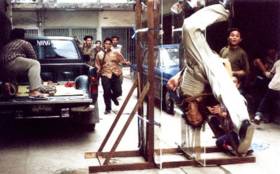
If any of you are old school martial arts fans then you must watch Ong Bak, which is currently running in theatres around the island. I watched it last night and it is too good. It's easily the best martial arts flick I've watched since Jackie Chan's Drunken Master 2 came out way back in 1994. And just like early Jackie Chan films, Tony Jaa (the star of Ong Bak) uses no wirework or CG effects.
One of the things I hate about recent martial arts films is that each combo is chopped up into way too many different camera shots, zooming in on a body part, and then the face, and then the spectators, then to the opponent, and so on. So we never get to appreciate the beauty of the combo in its continuous entirety. Ong Bak however does it old school. Each of the really amazing blows, jumps, or combos are not only presented in one full camera shot, but we get to see slo-mo double takes from different camera angles to really enjoy Tony Jaa's amazing skills.
Another reason why I think I enjoyed the movie so much is because I have never seen Muay Thai used in a (good) movie before. Most people are by now quite familiar with the Kung-Fu/Wushu featured in countless martial arts films, but this is brand new. There's alot of knees and elbows which means very close contact fighting, and the skull-cracking is something you won't see in "Muay Thai Kickboxing" matches on TV.
And best of all the movie is packed with fighting and stunts... the plot is secondary. Tony Jaa is being billed as the next Bruce Lee or Jackie Chan, and there is talk of him being picked up by Hollywood. But God I hope he doesn't go to Hollywood, where he'll be forced to do stupid movies which put the plot before the action. But he's definitely good enough to be Lee's and Chan's successor.
So anyways, if you're sick of all the rubbish Wire-Fu and Hollywood-Fu martial arts movies then definitely watch Ong-Bak.
Strav emailed me a few days back and wanted me to help spread the word about this event next week:
The Open Discussion on Gender Segregation in Bahrain's Educational Institutions/Universities to be hosted by the Al Montada Society on
December 4th at the Gulf Hotel will start at around 7pm. High school & college students, parents, educators, those working in the industry are most welcome to attend and discussions will take place in a billingual atmosphere (English & Arabic). You may quote the source of the event as UCBForms (ucbforums.info) & one of the organizers as Moh'd Fakhro (A Senior) at UCB (University College Bahrain - The Canadian University in Saar).
This should be quite interesting in light of the attempts by our MPs to segregate the University of Bahrain. So mark your calendars. Updates and followups to the event will be posted here.
Update (28-Nov-04):Strav informs us that the above event has been postponed to a later date yet to be decided, so too bad. We'll have to wait a bit longer.

The "Ansar al-Islam Bahrain" website that I mentioned a few days ago has been updated once again with some interesting new information:
Messge to Bahrain... to the World
We are a group of graduated university students who have the abilty to destroy the economic system of Bahrain.
We need to work.
We want from American Forces to go out from our country.
We have the know ledges& latest weapons technology.
We are responsible to what happened to Bahrain during Electrical Fail in the last summer.
If you want to be away from our destroying force, give us the opportunity to work Lets the American Forces leave Bahrain.
Ermmm... okay then. I can bet what their next demand will be... "One million dollars!"
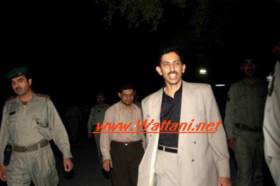
So King Hamad decided to play the wild card of the Royal Pardon and saved the day. Yesterday afternoon I thought it would be unlikely that he would step in, but now in hindsight it seems as though it had to happen. Here are a few possible reasons that might have pushed the King to make his decision. (i) Amnesty International sent a representative to observe the trial. (ii) The King will be visiting the US next week. (iii) It allows him to further enhance his "Good Cop" image versus the "Bad Cop" image of the Prime Minister. (iv) It sends the strongest signal yet from the King (the Newbie) to the Prime Minister (the Veteran) and his supporters letting them know who is the boss. (v) And God forbid, maybe the King actually has a conscience and a sense of justice.
I imagine that this outcome had been decided a long time ago, but the King couldn't just order Al-Khawaja's release before the verdict was given since that would be too big a loss of face for his uncle the PM. By pardoning Al-Khawaja's remaining prison sentence after a guilty verdict the message is toned down somewhat. It says: "Yes Al-Khawaja is guilty, but We have forgiven him out of Our benevolence and magnanimity." It does not say: "Okay, you were right, we were wrong, and for that we're sorry." Don't forget that Al-Khawaja sat in prison for almost two months for the duration of his trial for which (I assume) he will not receive any compensation.
So then what's next? Well this whole affair has raised several important issues in Bahrain that need to be dealt with sooner or later:
But there's still the question of the Prime Minister left. It was after all Al-Khawaja's demand for the PM's resignation that got him arrested. According to a report from Reuters (via Arab News), Al-Khawaja has vowed to continue his campaign against the PM:
He said he would continue to call for the resignation of Prime Minister Sheikh Khalifa ibn Salman Al-Khalifa, whom he blamed for “deep-rooted corruption” and whose criticism landed him in jail.
“The king and the crown prince are both on the side of reforms but the prime minister is a major hurdle,” he said. (Continued)
In several of my previous posts I have argued that the Opposition should continue to demand the right to be able to publicly criticize the PM (or anyone else), but they should drop the demand for his actual resignation. The former demand is a human rights issue that is difficult to argue againse, whereas the latter is a purely political issue. I argued that it's more important to focus on correcting the state's policies rather than its personalities. Once the policies are fixed, the personalities will have to either correct themselves, or be replaced altogether.
I still stand by that argument of mine, but I will admit that opposing arguments cannot be entirely discounted either. Al-Khawaja and the opposition seem to believe that the dynamics of change will act in the opposite direction. Their argument is that it won't be possible to make any real implementable policy changes while the current PM and his government remain in power. I don't entirely agree with this view, but I can understand why some people hold this opinion. This is after all a chicken and egg problem, so either side can be debated.
Although I disagree with those who think that getting rid of the Prime Minister will solve all of the country's problems, I do think it's time for him to go. Not necessarily because I blame him for all of Bahrain's social and economic woes, but simply because he has been the head of government for over 30 years now. I don't think it's too much for citizens to ask for a new head of government once in three decades. A change would do good.
And I suspect that the King and Crown Prince would be happy to see him off also. It seems that they are beginning to recognize the benefit of political stability that they might gain by transforming into a real constitutional monarchy. Even though they won't maintain the political control they currently have, they will have secured their position within the system, and will be able to live quite comfortably. After all, the Queen of England and her family don't seem to be doing too bad for themselves. The Prime Minister however does have a lot to lose. Over the years he has amassed a huge amount of wealth and business interests because of his political position. Once he loses his office all of this could come under threat. Although he would still be able to rely on his nephew the King to take good care of him, the relative loss for him personally would be so large that it is very unlikely that he would step down of his own will.
Furthermore, I suspect that the opposition has been making it more difficult for the King and Crown Prince to pressure the PM out of office. I've mentioned before that saving face is of huge importance in this part of the world. I very much doubt that the PM would leave under public demands for his resignation, since it would look as though he is submitting to their will, and that would be too big a loss of face. I would think that it would actually strengthen his resolve to stay in power. In order for him to step down an avenue must be created which allows him to exit "respectfully". This would mean creating the conditions under which he could publicly say "I am stepping down out of my love for this country and my great benevolence, and I also want to devote more time to my family and personal interests". Of course, the real reason would be due to pressure, or even a sacking, from the King and Crown Prince (as Mahmood hinted towards). Such conditions can not arise while people are lining the streets holding placards that say "PM, we are sick and tired of you. Leave now".
Well let's see what happens next. Things are getting very interested and changes are on their way.
Disclaimer: Much of what I have said above is pure speculation. I don't have any hard evidence or inside info to back up all of my claims. It's just my assessment as an observer.
From AP via the Guardian:
MANAMA, Bahrain (AP) - Bahrain's king pardoned a human rights activist who convicted of inciting hatred of the government and sentenced to one year in prison Sunday in a case linked to criticism of the prime minister.
The king, Sheik Hamad, pardoned Abdul-Hadi al-Khawaja from serving the rest of his sentence. He had been detained since Sept. 25.
Sheik Hamad also ordered the release of 13 people who were arrested last month during a demonstration in his support.

Constitution of the Kingdom of Bahrain
14th Feb 2002
Article 23Freedom of opinion and scientific research is guaranteed. Everyone has the right to express his opinion and publish it by word of mouth, in writing, or otherwise under the rules and conditions laid down by law, provided that the fundamental beliefs of Islamic doctrine are not infringed, the unity of the people is not prejudiced, and discord or sectarianism is not aroused.
It was always expected but never to be accepted. This morning a court sentenced Abdulhadi Al-Khawaja to a year in prison, convicted of "inciting hatred against the government". He is now Bahrain's first political prisoner since King Hamad's reforms starting in 1999. This will surely be a source of embarassment for the Ruling Regime.
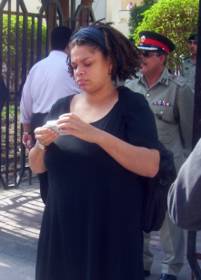
Amnesty International sent British human rights lawyer Joanna Oyediran (pictured above) to Bahrain to observe the trial. According to Reuters via BBC News this was her reaction:
"The verdict is a dangerous step against human rights in Bahrain," said Joanna Oyediran, an AI representative, who attended the hearing.
"Khawaja is a prisoner of conscience and we demand his immediate and unconditional release. We will continue to campaign on this case," she told Reuters news agency.
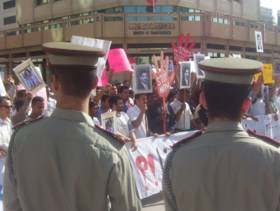
Outside the court almost 200 protesters gathered in support of Al-Khawaja chanting anti-government slogans. I recorded some chants on my mobile to share them with you. (Unfortunately my ancient laptop that had an infrared port has died on me, so I had to transfer it to my desktop through a microphone. So apologies for the crappy quality).
On several occasions, the crowd broke in chants of "Death to Khalifa", but the protest leaders immediately brought it to a halt. I think the leaders generally did a good job of keeping the protesters under control. At the end of the protest I saw two men approach one of the leaders to complain about why they are packing up so early. The leader told them they would be issuing a programme of planned demonstrations soon. He then proceeded to stress the need for all of the activities to be peaceful in order for the protesters to maintain the moral upper hand. He must have told those two men at least five times that "the most important thing is to remain peaceful".

I also recorded a clip of the statement made by Al-Khawaja's wife, Khadija Al-Mousawi (pictured above). It's nothing new really, but anyways the link is here (mp3 958KB) if you're interested.
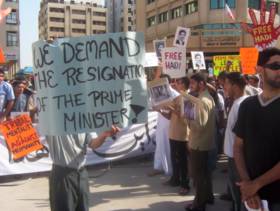
As I mentioned in my post after the second court session, this situation at the court is a bizarre one. Inside the courtroom, a citizen was jailed for criticizing the Prime Minister. Just outside the court, crowds of citizens held signs and chanted for the Prime Minister's resignation, yet the authorities did nothing. To me, this indicates that Al-Khawaja's arrest was not meant to set a precedent on how to handle things. Rather, it was probably just an attempted scare tactic gone wrong. Even though the authorities probably realized soon that the arrest was unwise, they could not just set him free because that would mean the Prime Minister would lose face... so they just kept on digging. On top of this is what seems to be a struggle between the Old Guard and the Reformists within the Ruling Regime itself.
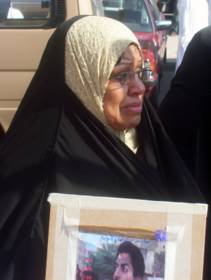
So what are we left with? It's hard for me to imagine Al-Khawaja being released before completing his sentence (but it could happen if the King steps in). But this has given strength to the opposition and allows them portray themselves as victims. So the demonstrations are set to continue until a deal is reached, or the opposition tires out. There is talk of a protest being held tonight in Seef but there has been no official announcement yet. Emotions seem to be running very high, and even though the leaders have repeatedly stressed the need for peace, I fear that some misguided youths may carry out isolated acts of violence.
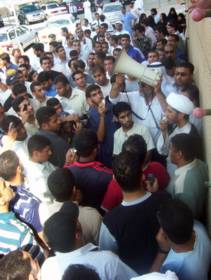
It seems the time has finally come for all of us to express our disapproval through whatever means we have: by blogging about it, by contacting our MPs and the government, by contacting international organizations, or by taking to the streets. I don't agree with everything said by Al-Khawaja in his capacity as a so-called "human rights activist", but I certainly think he has a right to express his opinion just like any other citizen. This is an extremely important issue because it is the first test case of whether King Hamad's reforms have any real substance to them. I am an optimist, so I want to believe that the reforms are real and that this whole "Al-Khawaja Affair" is just a necessary excercise along the road to democracy. In order for me to proven correct however Al-Khawaja needs to eventually get the justice afforded to him in a democracy. Therefore, the movement must continue.
Finally, here's some advice for the government:
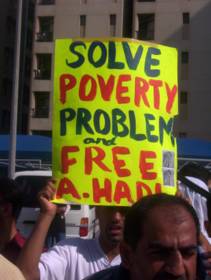
Update (5:58pm): Watch this video (wmv 6.52MB) if you're not impressed with my crappy sound clips.
Update (7:46pm): A completely unconfirmed report is going around that Al-Khawaja and the remaining detainees have been given a royal pardon by the King. Does anyone have more info about this?
I just got back from the courts. Abdulhadi Al-Khawaja, the vice-president of the Bahrain Centre for Human Rights has been sentenced to one year in prison for criticizing the Prime Minister. Disgraceful.
I'll have my photos uploaded in a few hours, so check back later.
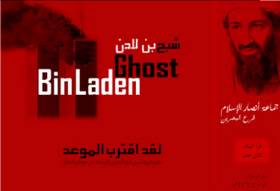
Has anyone recently re-visited the supposed "Ansar al-Islam Bahrain" website that was the source of a recent terrorist threat to Bahrain? Well it now has a new entrance page, pictured above. Here's the interesting thing. When the site first popped up, Bu Lahab noticed that there was a spelling mistake in that the last dot on the word "شیخ" (shaikh) was missing, rendering it meaningless as "شیح" (shai7):

However, on the new front page, the word is missing yet another dot, rendering it "شبح" (shaba7), meaning "ghost":

However, this can't be a typo because the big English text right next to it also says "Ghost Bin Laden". Now what is meant by "Ghost Bin Laden", I have no clue. I would like to imagine, as does Bu Lahab, that this site was created by someone with too much time on his hands, and is having a great bloody laugh reading my analysis of his missing dots. But you can never be too sure.
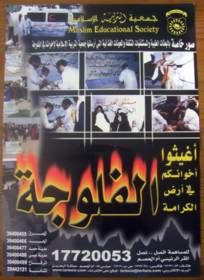
For the past two weeks, the Friday khutba (sermon) at my mosque has been about the American assault on Falluja. Yesterday at the end of his khutba the imam dedicated all of the du'a (prayer) to the residents of Falluja, and prayed for the "ground beneath the invader's feet to quake". While leaving the mosque there were several people collecting money to aid the Fallujans, and flyers like the one pictured above were being handed out. There were also two separate protests held yesterday in Manama and Muharraq against the occupation of Iraq, and in support of the insurgents of Falluja.
It's hard for me to take a strong stand on either side. On the one hand, the (possibly foreign) terrorists who are beheading people need to be dealt with. On the other hand, it's not entirely clear who the insurgents in Falluja are, and I don't think that bombing an entire city is much of a solution.
What is clear however is that the Americans have once again done a terrible job of their PR. With the stories and pictures coming out of Falluja about ordinary residents and refugees, and especially the video footage of the wounded insurgent that was shot in the head point-blank by a US marine, this operation is turning in to another Abu Ghraib. The Americans are just terrible with PR, and it seems to be a defining policy of the Bush administration to specifically not care about how they are perceived by others. The reality however is that in the short term, PR will be as important (or more) as the actual operations that take place on the ground. While the US forces have done many good and bad things for Iraqis, they don't seem to see the strategic value of highlighting the good things. Whenever the Americans hold a press conference the generals look so very smug and proud of themselves when describing how they demolished building with their huge bombs. But when it comes to describing the reconstruction efforts they are bland. It's strange that they haven't tried to spin things in Iraq for Iraqis, even though we saw them do a great job of spinning things in Iraq for Americans during the recent elections.
This lack of good PR is obvious to me sitting here in Bahrain, the home of the US Navy Fifth Fleet. Most of the major embassies on the island make a significant effort to get people to understand the states they represent through frequent cultural, musical and artistic events, such as the Leonard Eto performance on Thursday night that was arranged by the Japanese embassy. The British Embassy arranges events through the British Council, and the French Embassy has the Alliance Francaise. The events are well publicized so many Bahrainis show up. The American Embassy however rarely holds such events, and when they do they don't do enough to publicize it among Bahrainis. The result is that their events are attended mostly by American nationals and other expats. These events might seem trivial, but I believe that it makes a big difference as it allows us to look beyond the portrayal of Americans in camouflage on Al-Jazeera.
In the way that the passive attitude of most Muslims is ultimately to blame for our negative portrayal in the US, so is America ultimately to blame for its negative portrayal in our parts. It's sad. Everyday I see how more and more of my friends and family are rejecting anything American, because they don't have the means to interact with real Americans and the values they stand for.

I had the pleasure of watching Taiko virtuoso Leonard Eto and the rest of the Leo Project Ensemble perform last night at the Arad Fort. It was brilliant. The fort as a backdrop for the performers, the sea and the Manama skyline behind the audience, perfect weather and a light sea breeze to complement the excellent music. And best of all it was FREE (even the refreshments) on behalf of the Japanese Embassy, so many many thanks to them for arranging it. Hope to see many more of such events in Bahrain.
There is something very special about listening to pure unadulterated rhythms. Whether it's Leonard Eto from Japan, Doudou N'Diaye Rose from Senegal or Pappu Sain from Pakistan, their music seems to evoke something carnal, primordial from deep down within all of us. Even young children are fascinated by raw beats. Some people have suggested that this is because of our relation to our mother's heartbeat while in her womb, or to our own heartbeat, or the rhythms and cycles of the universe. Regardless, its beautiful.
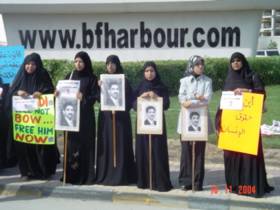
I wasn't able to attend the protest in support of Al-Khawaja that took place yesterday by the Bahrain Financial Harbour, but by the looks of it the turnout wasn't huge. Look at some photos here, or watch a video (wmv 4.5MB). Well, that's what you get at 10am on a Thursday morning. It was comforting however to see that the government did not interfere with this demonstration. This was the first demonstration held by The Committee in Support of Al-Khawaja since the car parade rally that the police broke up with tear gas a few weeks back. So that seems to confirm it: the government is only interfering with demonstrations that make use of vehicles, not all protests. It seems that they will let normal protests on foot go ahead without any trouble (unless of course our retard MPs decide to pass the proposed law to clamp down on demonstrations).
The final verdict on Al-Khawaja will be delivered on Sunday. I hope that the government is wise enough to release him. Thanks to the government's actions, Al-Khawaja has become a superstar. And from the looks of this video (wmv 4.8MB), Abdelrauf Al-Shayeb (another detainee) is also on his way to superstardom. The detainees have been on hunger strikes, and most of them have been in and out of hospital. If the government were to find Al-Khawaja guilty then it would have on its hands the first political prisoner since all were released during King Hamad's reforms in 2001. Asides from this being morally wrong (let's assume the government doesn't care about morality for argument's sake), it would surely hurt the Kingdom's image abroad, affecting business, and maybe even the ratification of US-Bahrain free trade agreement (it's unlikely but possible). Can the King afford risking all this at such a crucial time, merely to save the face of his uncle the Prime Minister? I hope not, but family ties go quite deep around here.
All I want is to be able to go back to studying the important poverty issue that sparked this whole drama.
Below is a report from the GDN on the condition of Al-Khawaja and the other detainees who went on hunger strike. Published in the GDN on 19-Nov-04.
Al Khawaja treated after fainting
By ABDULRAHMAN FAKHRI and MOHAMMED AL A'ALI
Abdul Hadi Al Khawaja was taken to the BDF Hospital for treatment last night after fainting in his prison cell.
He later spoke to his wife and pledged that once he was released from hospital he would continue his hunger strike until he appeared in court on Sunday, said Nabeel Rajab, president of the now dissolved Bahrain Centre for Human Rights.
Dr Abdul Jalil Al Segase of the committee for solidarity with Mr Al Khawaja said the former Bahrain Human Rights Centre executive director had been given intravenous fluids at the hospital. He began his hunger strike on Monday and stopped taking water on Tuesday.
Later, he was reported to have been returned to prison.
Thirteen people arrested during rallies held to call for the release of Al Khawaja ended their hunger strike earlier in the day following the appeal of the committee in support of the human rights activist and their families.
Almost half of the detainees have been receiving medical treatment at one point since two separate hunger strikes were staged last Thursday and Monday. All have been released, including Bahraini activist Abdulraouf Al Shayeb who was admitted to hospital after vomiting blood at the Khamis Police Station prison, said Nabeel Rajab, president of the new dissolved Bahrain Centre for Human Rights.
Mr Al Shayeb, who is the former president of the National Committee for the Support of Martyrs and Torture, has been on a hunger strike since Monday and was refusing water since Tuesday.
Committee members and relatives urged the detainees to at least start drinking water on Wednesday after their health started to deteriorate.
The detainees are accused of staging rallies and "resisting the authorities".
Thirteen other people arrested for taking part in the protests have since been released by the General Prosecutor's office following a review of their cases.
Meanwhile, Bahrain Human Rights Society members Mohammed Al Mutawa and Abdulredha Al Sayed visited nine of the detainees yesterday.
They all looked in better shape after giving up their hunger strike but threatened to resume it unless they appear before the General Prosecutor on Sunday and are released.
Mr Al Mutawa and Mr Al Sayed visited the detainees in Budaiya, Khamia and Riffa police stations and recorded their grievances as did prosecutor Ahmed Bucheeri.
Here's something random. Sepoy over at Chapati Mystery has a post about Bahr al-Fava’id (Sea of Virtues), a 12th century text written for the education of kings and princes. Apparently, in a section titled "On the Wonders of Cities" it says:
If one settles in Bahrain, his spleen will enlarge and become swollen.
Ermm... okay... thanks for the warning Sepoy.
On a slightly less morbid note, Sepoy has also got a very interesting post about Bernard Lewis if that interests any of you.
Just a reminder that there will be a protest tomorrow morning at 10am near the Bahrain Financial Harbour site in support of Al-Khawaja and the remaining 12 detainees. Apparently they will be releasing lots of "balloons of freedom" as part of the demonstration (it took me ages to figure out what "بالونات" was. I kept reading it as "balwinat"... yes, I'm a fool).
Also, I attended the huge protest march for Al-Quds Day that took place last Friday. I'll try to post a writeup with photos sometime soon.
I've added to more Bahrain-related blogs to my blogroll. Insanity is run by a female Bahraini student in London, and Ethnically Incorrect is owned by Sume, an American mother of Vietnamese heritage, Muslim convert (self-described "ethnic wanderer") who will soon be moving to Bahrain (hopefully). Check them out.
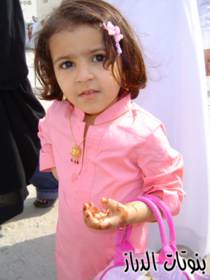
Welcome back everyone, I hope you all had an enjoyable Eid break. This was one of the best Eids for me in recent memory because I didn't have to make the usual fake chit-chat with everyone when I did my visits on the first day. Instead, everywhere I went, everyone had their eyes glued to the TV screen watching the Pakistan vs India cricket match (and what a great match it was). There was no need to discuss Bahrain's weather, or endure prolonged uncomfortable silences because we were all commenting on the game and cheering on our respective teams.
On the second day of Eid (which was the first day for most Bahrainis) I went along with a suggestion from Bahrania to visit the Eid festival in Diraz village. I wasn't sure about what time it was to be held, and when I asked Bahrania she replied back telling me "it's on now". So I headed over "now" only to find that I had arrived during the women's only session. I was stopped by a bunch of cocky young teenage boys who seemed to be guarding the entrance. They were hilarious. They started accusing me (in jest of course) of being a Peeping Tom wanting to pictures of the girls for my private pleasure. That wasn't my purpose, but I could tell that those teenage boys really did not mind their assigned job of keeping watch over all the young ladies!
Adolescent Bahraini boys are probably as cocky as you will get them anywhere in the world. Some of them wanted to see my camera so I showed it to them. They looked at it and then looked up and sang almost in unison "Aywa dijeetal!", impressed by the technologies I came armed with. They started fooling around with the camera while I was talking with one of the other boys. When I got back home I realized that they had taken a few photos without my noticing:
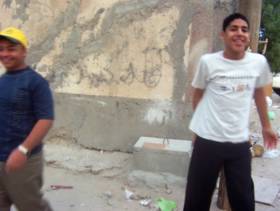
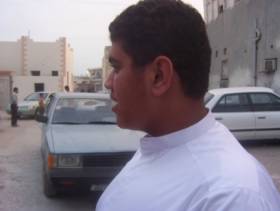
Hilarious. Those kids were too funny. Even though I didn't get to take photos of the actual festival I quite enjoyed joking around with those kids. But if you want to see what the festivities were actually like then click on the following links: 1, 2, 3.
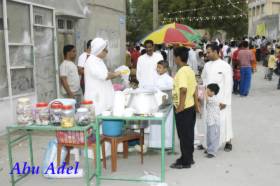
It seems like I missed a fun time, but hopefully I'll be able to be there to take my own photos next time. (Many thanks to Bahrania for telling me about this event)
And this is a bit late, but let me wish a very happy Diwali to all of the Hindu readers who were celebrating it as we were celebrating Eid.
This is just an update on the Al-Khawaja affair for those of you who are checking. It's Eid right now so I'm not able to put in a full post.
First, please download this video (wmv 27.2MB) before the BCHR website goes offline again. Watch and you will see the truth of what happened at the car parade protest on the 28th of October. The government has been trying to portray it as though the protesters were blocking traffic, but you will see in the video that it was actually the cops who were the cause of it all.
Since my last post about Al-Khawaja, he himself has gone on a hunger strike until the group of protesters arrested during the car parade protest are released. Of the 30 originally arrested, 6 were released after about a week, and 8 more were released two days ago after an appearance before the Public Prosecutor. But there are still 12 who are being detained for another 15 days (yes, I know the numbers don't add up... I'll try working on it). These 12 have also decided to join Al-Khawaja by going on a hunger strike. The latest news is that one of the detainees, Zuhair al-Shehabi, had to be admitted in the BDF hospital after fainting, but he is still refusing to take any form of nutrition.
Also, the Committee in Support of Al-Khawaja has announced that they will be holding a protest on Thursday, 18th of November, at 10am, in front of the Bahrain Financial Harbour site (map). And recall that the verdict for Al-Khawaja's trial will be given on Nov 21.
That's all for now. Sorry I haven't provided much detail, and there are no links to articles. I'll fix it up when I get some more time.
The Ministry of Islamic Affairs has, once again, defied all known astronomical data and research by declaring Eid ul-Fitr for tomorrow. But who cares. Eid Mubarak to all of you out there! (and go easy on the baklava tomorrow)
Update: Please consider heading over to Bu Lahab's place to drop him an Eid greeting. He seems to need it more than some of us in Bahrain!

When they're not trying to restrict our freedoms, our joker MPs are trying to convert historic archaeologic sites in to land for housing. Yesterday's GDN reports:
The proposal was submitted to the services committee by Islamic Bloc chairman and parliament's legislative and legal affairs committee vice-chairman Ali Al Samahiji and Shaikh Jassim Al Saeedi.
Mr Al Samahiji said these lands lie idle after excavations end.
"These lands are useful and could be used for houses other than being used as a dumping ground for the neighbourhood," he said. (Continued)
Somehow, it never occured to these jokers that they could do something to stop these historic sites from being used as dumping grounds, and instead try to preserve what remains.
But it seems that the government has already beaten the MPs to it by several years. One of the sites that I have witnessed as it has sadly deteriorated is the historic 'Ain Umm as Sujoor freshwater spring in Diraz. The well was built way back during the times of the ancient Dilmun civilization, some 4000 years ago. I was trying to find some history about the spring and a bit of googling reveals this fascinating information:
Shaykh Ibraheem al-Mubarak (may Allah have mercy upon him) said in his book “The Past and Present Time of Bahrain”: [...] The famous spring “`Ayn al-Sajoor” which has been dried in the time of Abdil Malik Ibn Marwan, is in this village [Diraz].
During his detailed speech about the story of Abdil Malik Ibn Marwan, the people of Bagrain, and the famous spring “`Ayn al-Sajoor” after his conquering Bahrain, shaykh Yousif [al-Bahrani] (q.s.) added in his Kaskool:
“As for the famous spring “`Ayn al-Sajoor” mentioned in the end of the story; it is located in our village al-Duraaz in Bahrain. It is situated in west of Bahrain, near the shore. The historical excavation showed that this spring was full of water in the past times.
[+/-] show/hide the rest of this excerptThat cursed has ordered his men to fill it with stones and rocks in order to remove it. It remained like that until the time of ruling of the above-mentioned Hajj Yousif son of Nasir (a rich and famous man of Bahrain and a man known for his cleverness in finding underground water). This man who had discovered many springs before, opened a hole in the west side and could bring out water from that spring again. He set up tents round that spring and employed a number of workers who throw away the rocks and stone which were in that spring. It is said that those rocks were very big and heavy that even a hundred men cannot pull one of them.
That cursed brought those rocks from a village near Bahrain called (Jadaa). Hajj Yousif son of Nasir and his workers worked hard and when the water of that spring was about to gush from it, a worker of Hajj Yousif son of Nasir came to him and said: I have seen in a dream that this spring is formed as a woman and she needs a big ox. Hajj Yousif son of Nasir thought that he could be the above-mentioned ox, so he became afraid and sick, then he died after a while, and the well remained as it is until this day. It is said that the worker uttered those words only for a joke and that he aimed that Hajj Yousif son of Nasir make an offering and give him and other workers some meat. Some people of Bahrain used those rocks pulled from that well in building their houses while the rest are still accumulated round the well itself. It is said that tens of people were needed to pull one of those rocks and Allah alone knows best the fact of matters.”
Now, when I was in primary school we went to visit the spring as part of a field trip. Back then, the spring was a small pond. The site had not been maintained, but at least it was untouched, so it was still possible for a visitor to feel its ancient atmosphere. Today unfortunately, the water table has sunk so low that the spring has reduced to this dirty little puddle:
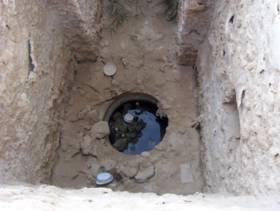

But even more worrying is the encroachment of building on or near the site. A few years back the authorities decided to fence off a portion of the site, and apparently sell off the remaining land. The ancient bricks that happened to be on that land were just chucked in to the fenced portion, so that someone could build a mansion. I hope that the souls of the ancient site will arise from their graves and scare away anyone that tries to build on their land.
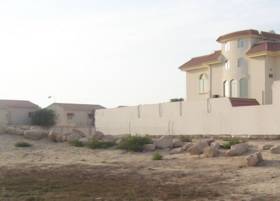
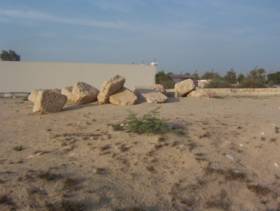
But now don't get me wrong; there certainly is a land crisis in Bahrain. However I don't think we should be over-running our history for this sake. If you ask me, I think the Royal Family should sell off some of the huge tracts of unused land that they own around the island. I'm sure that the amount of unused land they own far exceeds the combined space of land taken up by the archaeological sites. And maybe by giving up some land the Royal Family could gain some much needed public popularity.
The following article was printed in the GDN on 10-Nov-04:
'Historical sites for housing' call
Historical sites should be sold for housing once archaeologists have gleaned all they can from them, say MPs.
But Information Minister Nabeel Al Hamer told Parliament yesterday that some sites remained of historical interest, even though initial digs may have been completed.
Archaeological sites are registered with the Information Ministry.
But MPs yesterday agreed to send a proposal to the Cabinet that once finished, they be transferred to the Works and Housing Ministry.
They should then be sold to either the government or private investors for housing, say MPs.
The proposal was submitted to the services committee by Islamic Bloc chairman and parliament's legislative and legal affairs committee vice-chairman Ali Al Samahiji and Shaikh Jassim Al Saeedi.
Mr Al Samahiji said these lands lie idle after excavations end.
"These lands are useful and could be used for houses other than being used as a dumping ground for the neighbourhood," he said.
"We are facing a large population expansion and there are few lands available."
Mr Al Hamer said that the fenced lands were by themselves historical sites reaching back to thousands of years.
"We are still carrying out excavations in these lands and we have allocated some of next year's budget for that purpose," he said.
"Lands which are not needed get transferred to the Municipalities and Agriculture Ministry, which takes care of them."
This issue about a draft law to "regulate" protest demonstrations is really quite concerning. You can read some of the penalties under the proposed law by clicking here. Also, the GDN has finally got its act together and published a good report about this issue, which you can read by clicking here (Good on ya, GDN!).
For me personally, the thing that I'm concerned the most about is the restriction on expats. Under the proposed law, only Bahraini citizens will be allowed to participate in demonstrations. This point alone is completely ridiculous. As a socially concerned non-citizen I feel humiliated by this outright discrimination. The right to "freedom of peaceful assembly" is such a fundamental principle that must be afforded to anyone regardless of nationality. And it is something that I believe expats will need to make use of in the near future (especially when we consider that people are threatening to burn down expat labour camps in Sitra).
Asides from this, other points that raise (bloody huge) alarm bells is that the protest organizers must submit in advance for approval all materials (printed, video, or audio) that will be distributed at the event. And the Governer can choose to have the route of a march changed at his discretion to any other place. And, the police has the right stand anywhere as long as it's not where the speaker is. So, as Ebrahim al-Sayed says in the GDN report, the cops could even choose to stand in the front row of a protest march!
Everyone in Bahrain should be outraged by this humiliating draft law that treats us all as though we are kids in a schoolground. Mahmood has issued a call to arms to all Bahraini citizens to contact their MPs about this and tell them that you disagree with the law. He is also working on online petitions. It is time that we wake up and start doing something. Enough is enough. Before this, we could accuse the MPs of merely being useless. But in pushing this draft law the MPs are actually trying to restrict our freedoms and working against the desires of the people they represent. Let's put an end to this rubbish.
Below are some of the penalties from the proposed law on demonstrations, as published in the GDN on 9-Nov-04
Penalties under the proposed law include the following:
Article 21: Anyone who calls for or organises an unlicensed public meeting, rally, demonstration or gathering, will face a prison sentence of not more than two years or a fine of up to BD1,000, or both. Anyone who announces a public meeting, rally, demonstration or gathering without permission, will face a prison sentence of up to one year or a fine not exceeding BD500, or both.
Article 22: Anyone attempting to organise an unlicensed gathering will face a prison sentence of up to six months or a fine of up to BD500, or both.
Article 23: Organisers who are granted permission to stage a public gathering based on false information given to authorities will face up to four months in jail or a fine of up to BD500, or both.
Article 24: Anyone taking part in an unlicensed public gathering despite a warning from public security authorities, faces up to six months in jail or a fine of up to BD500, or both.
Similar penalties will be imposed on anyone taking part in a public gathering, which takes place at a different time or location than originally stated or strays from the authorised route. Those who take part in the public gathering, despite orders to disperse, face similar penalties.
Article 25: Anyone taking part in a public gathering while carrying or hiding a weapon, even if licensed, faces a prison sentence of up to one year or a fine of up to BD500, or both.
Article 26: Anyone using a vehicle at a public gathering without a licence from the Interior Ministry faces up to four months in prison and a fine of up to BD50.
Article 27: Board members or directors of a society, club, sports organisation or company face a up to six months in prison and/or a fine of up to BD500 if they allow an unlicensed public gathering to take place at its premises.
Article 28: Anyone who violates the provisions of these articles - either through negligence, approval or by covering up the actions of others - faces a fine of BD1,000 to BD5,000.
Article 29: People not punishable under the law are:
* Anyone, excluding organisers, that leaves an unlicensed gathering before or after being warned by police without committing a crime.
* Organisers of a public gathering which violates the law, who can prove they took all measures available to stop a crime being committed
Article 30: If any of the above is duplicated in another existing law, whichever has the stricter penalty will apply.
Below is a GDN report, published on 9-Nov-04, about the proposed law on gatherings.
MPs debate right to peaceful protest
Tough penalties could be imposed under a proposed new law to control public gatherings in Bahrain. ROBERT SMITH reports
A NEW draft law on public gatherings is likely to create fierce debate in Parliament, with opponents already campaigning against it.
They say it restricts freedoms because anyone who organises a public gathering without government permission could be jailed and fined.
The draft law has been proposed by the government and forwarded to Parliament for approval.
If MPs back the law, anyone who organises a public gathering without permission faces up to two years in prison or a fine of up to BD1,000, or both.
Lawyer and MP Fareed Rafie expects the law to be passed because of large government support in Parliament and the Shura Council, which will also review the draft.
He says the important thing is to modify it to make sure that by the time it goes through, it does not threaten the rights of citizens.
This week the legislative and legal affairs committee member has been visiting fellow MPs to persuade them to push for changes in the draft.
"I am one of the few liberal MPs," he said. "We don't have the majority to reject this law in Parliament.
"So I am trying to go through the articles and remove from the law anything that is against freedom and democracy."
He thinks the government drafted such a strict law because it expected MPs to make changes in Parliament.
"I think if you read between the lines the government wants Parliament to reduce it," said Mr Rafie, who is a member of the Bahrain Bar Society and a practising lawyer.
He expects parliament to vote on the draft legislation some time after Eid, but says it could take less than two months to go through Shura Council, before being submitted to His Majesty King Hamad for ratification.
The law defines public gatherings as any meeting that takes place in a public or private place, which does not require an invitation to attend.
"This law is draconian," said National Democratic Action Society (NDAS) board member Ebrahim Alsayed.
"We call it the law against gatherings - not the law to regulate gatherings. That's because the provisions of this law are so harsh."
If the law is passed, organisers of any public gathering will have to apply for permission from the governor of the area where it will take place.
He is appointed by the government and would decide whether or not to give the go-ahead depending on the number of people taking part, the subject of the gathering and the materials that will be distributed.
Under current laws, organisers of any public gathering simply have to notify the government it will take place.
Under the draft law, organisers could be penalised for announcing their event before getting permission.
The request would have to be submitted five days in advance and be signed by three to 10 people - including their names; occupations; addresses; CPR numbers; the reason for the meeting; the duration, time and place and the route of any march.
The application would have to be accompanied by any printed, video or audio materials that will be distributed.
"It is pre-emptive," said Mr Alsayed.
"They have to see the material to see if they will give permission.
"It is not just looking at it from a security point of view - such as making sure the roads are not blocked.
"It is also a scrutiny of the material that will be presented."
Under the draft law, an event could only be advertised once the governor has given permission for it to go ahead.
However, he does not have to grant permission until two days before it is due to take place.
Opponents to the law say this is not enough time to advertise the event.
"You can't possibly organise a big event with two days notice," said Mr Alsayed.
"By the time you announce the event it is just one day before it takes place.
"That is impossible to call for a large gathering.
"They put these provisions to make it impossible for a large gathering to happen.
"Even if it is approved it is too late to advertise."
If the governor refused permission, organisers of any gathering would have three days to appeal to the Interior Minister, who would then have three days to respond.
However, if the governor rejects an application two days in advance and the organisers appeal immediately - they might have to wait three days for a response, by which time the day of their event would have come and gone.
If the Interior Minister refused they could also appeal to the Supreme Civil Appeals Court, which would decide the urgency of the request before issuing a final verdict.
However, opponents say that even if the court granted permission for a gathering to take place after the governor blocked it, it would be too late.
"If you appeal it takes time and by the time you got approval, the event you wanted to stage could have become irrelevant," said Mr Alsayed.
In addition, anyone organising an event must be a resident of the area where it will take place and also "belong" there.
That means under the new law, anyone who wanted to organise a demonstration outside Parliament would have to be from that particular area of Manama.
Every gathering would also require an organising committee of at least three people, who would be responsible for maintaining order.
They would have to halt anything that went against religion, breaks the law, damages the reputation of the state or is critical of a friendly country.
Police can choose to attend a gathering and sit wherever they want, as long as it is not where the speakers are, under the draft law.
"They could sit on the front row if they wanted to," said Mr Alsayed.
Authorities could also move in to end a gathering if they thought it would result in a breach of security.
"This is pre-emptive again," said Mr Alsayed.
"If they even think this will happen they can end the gathering."
The proposed legislation also limits the hours when gatherings can take place and prevents demonstrations taking place at night, unless permission is specifically granted.
It also says that only Bahraini citizens can take part in political protests.
"That could mean that if you want to demonstrate against the US occupation of Iraq, only Bahrainis could take part - not Iraqis," said Mr Alsayed.
Marches that move from one governorate to another have to be approved by the Interior Ministry, while the governor can change the route of any march or the place of gathering, under the draft law.
"He could send you to a small alley where nobody would notice your demonstration," said Mr Alsayed.
The sentence for attending an unlicensed gathering would be six months in jail or a BD500 fine, or both, under the draft.
"We are talking about people who attend a peaceful gathering," said Mr Alsayed.
"We are not talking about fighting with a police officer. We are talking about people attending an unlicensed demonstration."
Those gatherings not covered by the draft law include those that are "purely religious", are arranged by a government body, or are called by official clubs and societies to discuss matters related to them.
They do not have to apply for permission.
However, only members of societies and clubs can attend meetings organised by them and they can only discuss topics specifically related to the organisation's field of work.
Otherwise it is regarded as a public gathering and organisers have to get a licence.
Electoral meetings are also dealt with separately under the law.
"The government supporters say it is a response to unruly demonstrations in recent weeks," said Mr Alsayed.
"But we are saying there are enough provisions in the existing laws to punish people that committed crimes.
"Anyone that acted unreasonably at demonstrations could have been taken to court without the need for this law."
In addition, Mr Alsayed expressed concern over the "selective" way laws are applied.
"If you want to stage a car parade they say it is blocking traffic - that is a fair objection," he said.
"The next time a football team wins a competition they will go on a car parade. Will they stop them? No.
"It is the practice in Bahrain when people get married for a motorcade to follow the bride and groom. Will they stop this? No.
"People will not take permission. What are 100 cars on the highway?
"But when members of the opposition do a similar thing it becomes a traffic obstruction and a danger to life."
He added that unlicensed demonstrations would go ahead regardless - even if the law were passed by parliament.
"We are going to test this law very quickly," he said.
"We won't let the state have a honeymoon. If they pass the resolution we will make sure the prisons are full of people who break this law."
Those sentiments were echoed by Nabeel Rajab, president of the now dissolved Bahrain Centre for Human Rights (BCHR).
Most of the demonstrations over the past month have been calling for the release of BCHR executive director Abdul Hadi Al Khawaja, who was arrested after speaking at a poverty seminar organised by the society in September.
He faces charges including inciting hatred against the government.
"We find the draft law very dangerous," said Mr Rajab, who described it as a knee-jerk reaction.
"This will control all gatherings - even peaceful protests.
"This kind of activity is the only way to express your opinion. It is the only one not controlled by the government.
"It means that if you want to protest against the government you have to take permission, but I don't think they will grant permission for you to criticise it.
"They are talking about punishment and jail. It will take us back to the 60s and 70s."
Lo! We revealed it on the Night of Predestination.
Ah, what will convey unto thee what the Night of Power is!
The Night of Power is better than a thousand months.
The angels and the Spirit descend therein, by the permission of their Lord, with all decrees.
Peace until the rising of the dawn.

Step in to the magical time-machine my friends and let's go back in time to the 90s!!! Re-live those oh so enjoyable memories of the State Security law when you could get jailed for merely taking part in a peaceful protest. Oh how I cherish those days when it was impossible for anyone to say anything out loud in public without being threatened by the government. Ah, those were the days my friends.
Well we may get a chance to experience it all again if the government has its way and our parliament passes the proposed law on public demonstrations to gain a few brownie points. The esteemed MPs who are supporting this bill argue that the new law will help democracy. MP Adel Al-Moawada is quoted in the Gulf News as saying:
The proposed legislation is aimed to regulate freedoms, not to restrict them.
Let me be clear. I would normally support a law that regulates protests since it is very important to have legislation that makes perfectly clear what the rights and restrictions of both the demonstrators and the authorities are. However it's hard to take our MPs seriously when the very chairman of the Council of Representatives, Khalifa al-Dhahrani, is quoted in Al-Ayam as saying: "If I were a security officer, I would use a bulldozer to remove these cars," when speaking about the peaceful car parade rallies that took place in support of Al-Khawaja in the past.
And after reading the details of the proposed law, it seems our scepticism of the MPs is well founded. The draft law proposes that anyone who want to organize a demonstration must get prior permission from the governor(s) of the governorate(s) in which they plan to hold it, and it can only be held between 9am and sunset. Anyone that holds an unauthorised demonstration can be fined up to BD1,000 (that's about US$2,650) and jailed for two years! And this is supposed to promote "real democracy"? What a joke. It is obvious that the real reason for these stiff penalties is to create red tape for activists, and to scare away any citizens who might be thinking about attending a protest. Think about it. If you are a parent supporting children, or if your parents are dependent on you, it would be too much of a risk to attend a protest which might end you up in jail and leave your loved ones helpless.
Also, this law makes no mention of regulating the interference of the police in protests. So at the end of the day the draft law imposes a bunch of restrictions on demonstrators, and leaves the authorities to do as they please.
This is a terrible blow to democracy and freedom. Let's hope that it doesn't get passed, but it seems unlikely. Here is something you can do sitting at home. Find the name of the MP representing your constituency from this directory, and then e-mail/fax/phone/sms them a polite message telling them how you feel, and how you want them to vote on the proposed law in parliament. Also, be sure to send your message to MP Khalifa al-Dhahrani, the Chairperson, and supporter of the bill. Maybe your efforts won't make a difference, but it's still important to exhaust all available options. Also, does anyone know if the Crown Prince has a public e-mail address at which citizens can contact him?
Here is the report from the Khaleej Times with the details of the proposed law:
MANAMA People taking part in unauthorised demonstrations and protests may face a fine up to BD1, 000 and jail for up to two years, if a proposal submitted by the government gets the approval of the Chamber of Deputies.
The draft law was presented to the Cabinet and was then transferred to the Chamber of Deputies for discussion and approval, is aimed at regularising the procedures of holding protests and curtailing unauthorised demonstrations. The draft law states that those who call upon, organise or hold unauthorised meetings, protests or demonstrations will be jailed for up to two years or fined up to BD1,000; those who call protests under false pretences or hold protests on the basis of false information will be jailed for up to four months and fined up to BD500; and those who take part in violent demonstrations or in those banned by the security forces or unauthorised ones will be jailed for up to four months and fined up to BD500.
Further, people using or carrying weapons during protests will be jailed for up to one year and fined up to BD500.
The draft law also states that board members and members of the management of unions, societies and clubs, including sports clubs, will be jailed for up to six months and fined up to BD500 if they hold an unauthorised meeting at their premises.
If a violation occurs at the premises of the unauthorised meeting and the board members do not call it off, they will be fined between BD1,000 and BD5,000.
If the violation occurs more than once in a year, the security forces can suspend the licence for 60 days.
People wanting to hold a protest should request permission from the governor of the concerned governorate by providing all the relevant details such as the location and time.
Additionally, if a protest is to take place in more than one governorate, permission should be obtained from the Minister for the Interior.
The governor has the right to change the location of the demonstration if it will cause traffic chaos or harm security.
Demonstrations can only be held between 9am and before sunset unless approved by the government, the draft law states.
Further, demonstrations cannot be held for poll campaigning.
The draft law also says that vehicles cannot be used in demonstrations unless approved by the interior minister.
When a violation occurs, security forces can confiscate the driving licence, registration and number plates for 30 days.
Some of you outside of Bahrain have been asking me what happened of Al-Khawaja's third court session that was scheduled to have taken place on Wednesday Nov 3. The session was posptponed to yesterday (I assume because of Shaikh Zayed's death). As I mentioned after the previous court session, Al-Khawaja had announced that he would not attend any more court sessions and he had instructed his lawyers not do so either, because the trial was "unconstitutional". Well yesterday his lawyers did not show up, but Al-Khawaja was made to go to the court by force. One account that I heard said he was still in his sleeping clothes and that he showed marks of force being used on his face. Since the lawyers were not present the judge adjourned the trial until November 21, when he will issue his verdict.
Things are heating up, and it seems like all of his supporters are just waiting for the self-imposed moratorium on demonstrations to end after Eid, so expect firework to go off. Also, I believe there is an unrelated protest that will take place on Friday marking the Worldwide Al-Quds Day, and by the way things are going, I won't be surprised if calls for the release of Al-Khawaja are heard at this also. Expect to see security goons crawling the island this weekend.
Well, here is the GDN's account of yesterday's trial session:
Activist Abdul Hadi Al Khawaja stripped to the waist in protest at being taken back to court yesterday.
Al Khawaja protested that he had been taken by force to court, after earlier insisting that he would boycott his own trial.
The former executive director of the now dissolved Bahrain Centre for Human Rights (BCHR) denies charges including inciting hatred against the government and spreading false propaganda designed to destabilise security.
He is also charged with defamation and spreading false information that could damage public interest.
Al Khawaja was arrested after giving a speech at a BCHR seminar on poverty, at the Al Oruba Club, Juffair, in September.
A judge at the Lower Criminal Court yesterday further adjourned the case until November 21, when he said a verdict would be given.
Al Khawaja was brought in the court with his hands cuffed behind his back. He refused to sit properly and lay down on the bench in the court.
Police took off the handcuffs as the judge was about to enter.
"Oh butcher, come out of the room, your offering has arrived," Al Khawaja shouted, while the judge was still in his chamber at the back of the court.
Al Khawaja then stripped off his shirt, telling police he wanted to appear half naked before the judge.
"You are an intellectual, so why are you acting like this ?" the judge asked him. "I did not want to come to the court and the police brought me here by force," Al Khawaja replied. "The police treated me like an animal so I am behaving like an animal."
He asked why he had been brought to court against his will. The judge replied that he ordered police to bring him, because his case was being heard.
"Since I did not want to come you should have carried on with the court hearing in my absence," said Mr Al Khawaja.
"Why don't you calm down," said the judge.
"No, I cannot calm down, the only way I can calm down is if you order the police to take me back to the prison and you carry on with the court hearing," said Al Khawaja.
"You can sentence me to five years in jail, then I'll calm down, I'll accept this thing.
"But I do not accept to be dragged here like an animal against my wishes.
"I don't think I will get a fair trial in this court."
He showed the judge the marks left on his wrists by the handcuffs as he struggled with police earlier as they tried to make him sit properly on the bench. Al Khawaja again claimed that he was being prosecuted under the state security laws of 1976, which he said were unconstitutional.
"I refuse to be tried in court on the basis of articles of the state security act," he said.
Al Khawaja's lawyer Fatima Al Hawaj was there, but he instructed her not to speak for him.
The public prosecutor submitted to the court a video of Al Khawaja's speech at the poverty seminar.
Ugh... this stuff makes me sick. From today's GDN:
A maid who claims she was raped three times in 48 hours by two members of the same family was released yesterday after spending Saturday night in police custody.
She was handed over to members of the Migrant Workers Group (MWG) after being taken for medical tests in the morning.
However, an officer at Budaiya Police Station refused to say whether the men had been arrested or released. Sources say they were taken in for questioning at about 7pm on Saturday and were kept there at least until 3am yesterday.
The Bangladeshi woman, whose passport says she is 25, only arrived in Bahrain on Wednesday.
She was allegedly picked up from her aunt's house on Thursday by her sponsor's nephew, who she says raped her on the way to her sponsor's house, in Barbar.
The woman claims her sponsor's son also raped her while she slept in the kitchen in the early hours of Friday morning.
She says the son raped her again in the early hours of Saturday.
Her sponsor then returned the woman on Saturday, but her aunt called the police later the same day.
Sources described the family as being influential and said a member of the Public Prosecution was called to the police station on Saturday night.
"That is the first time we have heard of that happening," sources told the GDN.
"He spoke to her and the other people. Their whole extended family went there - including a relative who is a lawyer.
"As far as we know they were not detained, but she was."
Why is it that it's always the maid who is arrested immediately (for what crime I do not know), but the authorities are so casual when dealing with the employers/sponsors accused of rape and abuse?
Here's a welcome piece of news from today's GDN:
Civil servants should be recruited on merit and nothing else, Shura Council members declared yesterday. Employees should be selected through official advertisements in local newspapers, otherwise their applications should be refused, council legislative and legal affairs committee chairman Mohammed Al Halwachi told the GDN yesterday.
"Even those applying through local papers should undergo personal interviews to ensure they are qualified to fulfil the position they have applied for," he said. "We want people to be selected according to their credentials and qualifications and not anything else. We want an end to random employment, ensuring that the best are being taken for the job." (Continued)
This is such a basic and obvious idea, that it almost seems a bit silly that a statement is needed. However a statement is needed because was6a culture is still rife in Bahrain. The hard part though is to translate this statement into actions. And this seems particularly difficult to implement universally when we consider that it is still official state policy for the ministries of defence and interior to discriminate according to sectarian affiliation. But I'm hopeful, for change must come eventually.